首次联网使用应用的用户。如果一个用户首次打开某APP,那这个用户定义为新增用户;卸载再安装的设备,不会被算作一次新增。新增用户包括日新增用户、周新增用户、月新增用户。
12.1 DWS层(每日新增设备明细表)
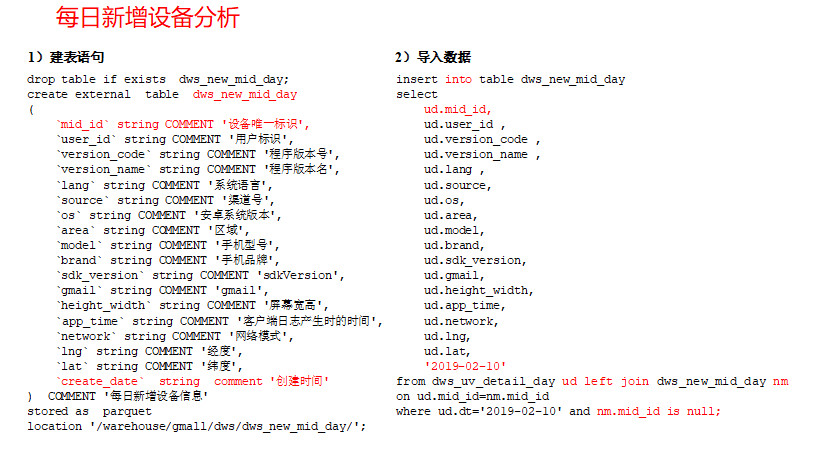
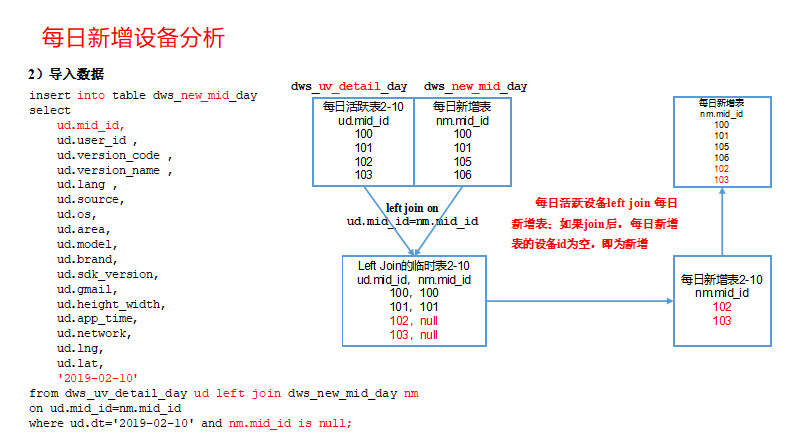
1)建表语句
drop table if exists dws_new_mid_day;
create external table dws_new_mid_day
(
`mid_id` string COMMENT '设备唯一标识',
`user_id` string COMMENT '用户标识',
`version_code` string COMMENT '程序版本号',
`version_name` string COMMENT '程序版本名',
`lang` string COMMENT '系统语言',
`source` string COMMENT '渠道号',
`os` string COMMENT '安卓系统版本',
`area` string COMMENT '区域',
`model` string COMMENT '手机型号',
`brand` string COMMENT '手机品牌',
`sdk_version` string COMMENT 'sdkVersion',
`gmail` string COMMENT 'gmail',
`height_width` string COMMENT '屏幕宽高',
`app_time` string COMMENT '客户端日志产生时的时间',
`network` string COMMENT '网络模式',
`lng` string COMMENT '经度',
`lat` string COMMENT '纬度',
`create_date` string comment '创建时间'
) COMMENT '每日新增设备信息'
stored as parquet
location '/warehouse/gmall/dws/dws_new_mid_day/';
2)导入数据
用每日活跃用户表Left Join每日新增设备表,关联的条件是mid_id相等。如果是每日新增的设备,则在每日新增设备表中为null。
insert into table dws_new_mid_day
select
ud.mid_id,
ud.user_id ,
ud.version_code ,
ud.version_name ,
ud.lang ,
ud.source,
ud.os,
ud.area,
ud.model,
ud.brand,
ud.sdk_version,
ud.gmail,
ud.height_width,
ud.app_time,
ud.network,
ud.lng,
ud.lat,
'2020-10-14'
from dws_uv_detail_day ud left join dws_new_mid_day nm on ud.mid_id=nm.mid_id
where ud.dt='2020-10-14' and nm.mid_id is null;
3)查询导入数据
select count(*) from dws_new_mid_day ;
4)导入数据脚本
vi dws_new_log.sh
#!/bin/bash
# 定义变量方便修改
APP=gmall
hive=/opt/module/hive/bin/hive
hadoop=/opt/module/hadoop-2.7.2/bin/hadoop
# 如果是输入的日期按照取输入日期;如果没输入日期取当前时间的前一天
if [ -n "$1" ] ;then
do_date=$1
else
do_date=`date -d "-1 day" +%F`
fi
echo "===日志日期为 $do_date==="
sql="
insert into table "$APP".dws_new_mid_day
select
ud.mid_id,
ud.user_id ,
ud.version_code ,
ud.version_name ,
ud.lang ,
ud.source,
ud.os,
ud.area,
ud.model,
ud.brand,
ud.sdk_version,
ud.gmail,
ud.height_width,
ud.app_time,
ud.network,
ud.lng,
ud.lat,
'$do_date'
from "$APP".dws_uv_detail_day ud left join "$APP".dws_new_mid_day nm on ud.mid_id=nm.mid_id
where ud.dt='$do_date' and nm.mid_id is null;
"
$hive -e "$sql"
12.2 ADS层(每日新增设备表)
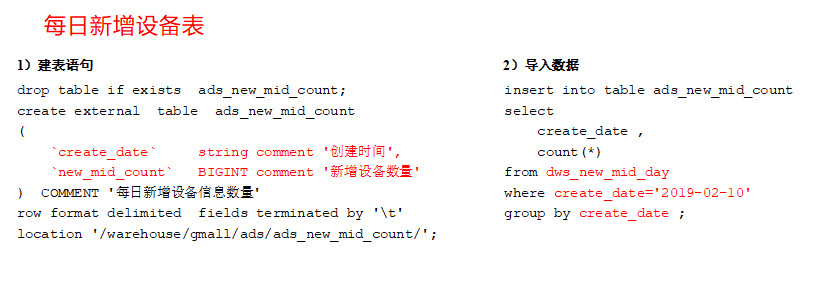
1)建表语句
drop table if exists ads_new_mid_count;
create external table ads_new_mid_count
(
`create_date` string comment '创建时间',
`new_mid_count` BIGINT comment '新增设备数量'
) COMMENT '每日新增设备信息数量'
row format delimited fields terminated by '\t'
location '/warehouse/gmall/ads/ads_new_mid_count/';
2)导入数据
insert into table ads_new_mid_count
select
create_date,
count(*)
from dws_new_mid_day
where create_date='2020-10-14'
group by create_date;
3)查询导入数据
select * from ads_new_mid_count;
4)导入数据脚本
[kgg@hadoop102 bin]$ vim ads_new_log.sh
第13章 需求三:用户留存主题
13.1 需求目标
13.1.1 用户留存概念

13.1.2 需求描述
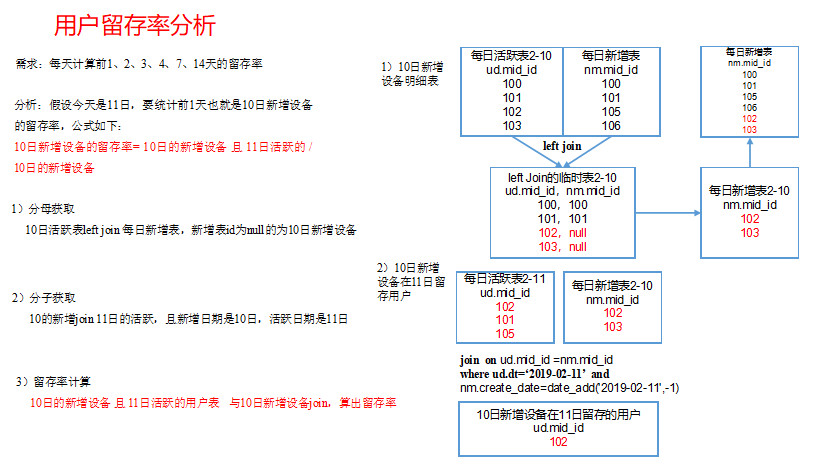
13.2 DWS层
13.2.1 DWS层(每日留存用户明细表)
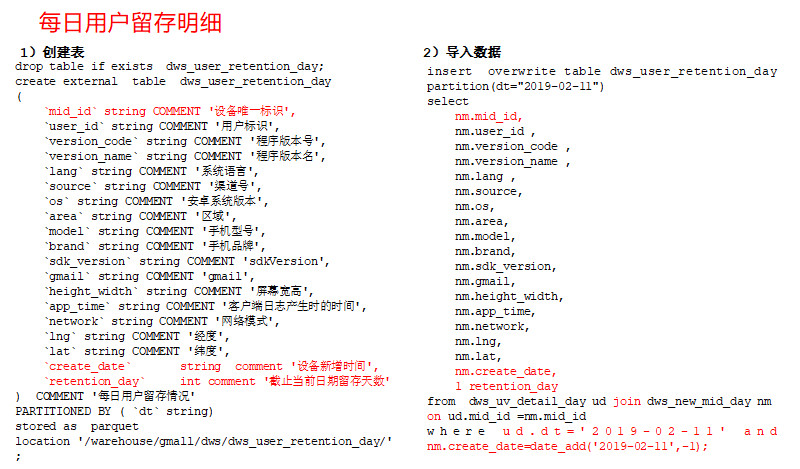
1)建表语句
drop table if exists dws_user_retention_day;
create external table dws_user_retention_day
(
`mid_id` string COMMENT '设备唯一标识',
`user_id` string COMMENT '用户标识',
`version_code` string COMMENT '程序版本号',
`version_name` string COMMENT '程序版本名',
`lang` string COMMENT '系统语言',
`source` string COMMENT '渠道号',
`os` string COMMENT '安卓系统版本',
`area` string COMMENT '区域',
`model` string COMMENT '手机型号',
`brand` string COMMENT '手机品牌',
`sdk_version` string COMMENT 'sdkVersion',
`gmail` string COMMENT 'gmail',
`height_width` string COMMENT '屏幕宽高',
`app_time` string COMMENT '客户端日志产生时的时间',
`network` string COMMENT '网络模式',
`lng` string COMMENT '经度',
`lat` string COMMENT '纬度',
`create_date` string comment '设备新增时间',
`retention_day` int comment '截止当前日期留存天数'
) COMMENT '每日用户留存情况'
PARTITIONED BY (`dt` string)
stored as parquet
location '/warehouse/gmall/dws/dws_user_retention_day/';
2)导入数据
(每天计算前1天的新用户访问留存明细)
insert overwrite table dws_user_retention_day
partition(dt="2020-10-15")
select
nm.mid_id,
nm.user_id ,
nm.version_code ,
nm.version_name ,
nm.lang ,
nm.source,
nm.os,
nm.area,
nm.model,
nm.brand,
nm.sdk_version,
nm.gmail,
nm.height_width,
nm.app_time,
nm.network,
nm.lng,
nm.lat,
nm.create_date,
1 retention_day
from dws_uv_detail_day ud join dws_new_mid_day nm on ud.mid_id=nm.mid_id where ud.dt='2020-10-15' and nm.create_date=date_add('2020-10-15',-1);
3)查询导入数据
(每天计算前1天的新用户访问留存明细)
select count(*) from dws_user_retention_day;
13.2.2 DWS层(1,2,3,n天留存用户明细表)
1)导入数据
(每天计算前1,2,3,n天的新用户访问留存明细)
insert overwrite table dws_user_retention_day
partition(dt="2019-02-11")
select
nm.mid_id,
nm.user_id,
nm.version_code,
nm.version_name,
nm.lang,
nm.source,
nm.os,
nm.area,
nm.model,
nm.brand,
nm.sdk_version,
nm.gmail,
nm.height_width,
nm.app_time,
nm.network,
nm.lng,
nm.lat,
nm.create_date,
1 retention_day
from dws_uv_detail_day ud join dws_new_mid_day nm on ud.mid_id =nm.mid_id
where ud.dt='2019-02-11' and nm.create_date=date_add('2019-02-11',-1)
union all
select
nm.mid_id,
nm.user_id ,
nm.version_code ,
nm.version_name ,
nm.lang ,
nm.source,
nm.os,
nm.area,
nm.model,
nm.brand,
nm.sdk_version,
nm.gmail,
nm.height_width,
nm.app_time,
nm.network,
nm.lng,
nm.lat,
nm.create_date,
2 retention_day
from dws_uv_detail_day ud join dws_new_mid_day nm on ud.mid_id =nm.mid_id
where ud.dt='2019-02-11' and nm.create_date=date_add('2019-02-11',-2)
union all
select
nm.mid_id,
nm.user_id,
nm.version_code,
nm.version_name,
nm.lang,
nm.source,
nm.os,
nm.area,
nm.model,
nm.brand,
nm.sdk_version,
nm.gmail,
nm.height_width,
nm.app_time,
nm.network,
nm.lng,
nm.lat,
nm.create_date,
3 retention_day
from dws_uv_detail_day ud join dws_new_mid_day nm on ud.mid_id =nm.mid_id
where ud.dt='2019-02-11' and nm.create_date=date_add('2019-02-11',-3);
2)查询导入数据
(每天计算前1,2,3天的新用户访问留存明细)
select retention_day , count(*) from dws_user_retention_day group by retention_day;
13.2.3 Union与Union all区别
1)准备两张表
tableA tableB
id name score id name score
1 a 80 1 d 48
2 b 79 2 e 23
3 c 68 3 c 86
2)采用union查询
select name from tableA
union
select name from tableB
查询结果
name
a
d
b
e
c
3)采用union all查询
select name from tableA
union all
select name from tableB
查询结果
name
a
b
c
d
e
c
4)总结
(1)union会将联合的结果集去重,效率较union all差 (2)union all不会对结果集去重,所以效率高
13.3 ADS层
13.3.1 留存用户数

1)建表语句
drop table if exists ads_user_retention_day_count;
create external table ads_user_retention_day_count
(
`create_date` string comment '设备新增日期',
`retention_day` int comment '截止当前日期留存天数',
`retention_count` bigint comment '留存数量'
) COMMENT '每日用户留存情况'
row format delimited fields terminated by '\t'
location '/warehouse/gmall/ads/ads_user_retention_day_count/';
2)导入数据
insert into table ads_user_retention_day_count
select
create_date,
retention_day,
count(*) retention_count
from dws_user_retention_day
where dt='2020-10-15'
group by create_date,retention_day;
3)查询导入数据
select * from ads_user_retention_day_count;
13.3.2 留存用户比率
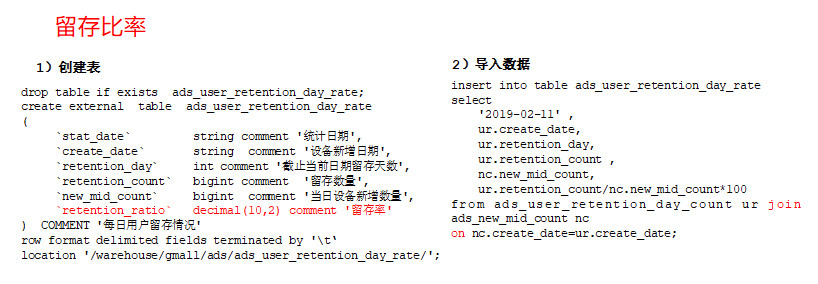
1)建表语句
drop table if exists ads_user_retention_day_rate;
create external table ads_user_retention_day_rate
(
`stat_date` string comment '统计日期',
`create_date` string comment '设备新增日期',
`retention_day` int comment '截止当前日期留存天数',
`retention_count` bigint comment '留存数量',
`new_mid_count` bigint comment '当日设备新增数量',
`retention_ratio` decimal(10,2) comment '留存率'
) COMMENT '每日用户留存情况'
row format delimited fields terminated by '\t'
location '/warehouse/gmall/ads/ads_user_retention_day_rate/';
2)导入数据
insert into table ads_user_retention_day_rate
select
'2020-10-14',
ur.create_date,
ur.retention_day,
ur.retention_count,
nc.new_mid_count,
ur.retention_count/nc.new_mid_count*100
from ads_user_retention_day_count ur join ads_new_mid_count nc
on nc.create_date=ur.create_date;
3)查询导入数据
select * from ads_user_retention_day_rate;
本文来自博客园,作者:大码王,转载请注明原文链接:https://www.cnblogs.com/huanghanyu/

 posted on
posted on

 浙公网安备 33010602011771号
浙公网安备 33010602011771号